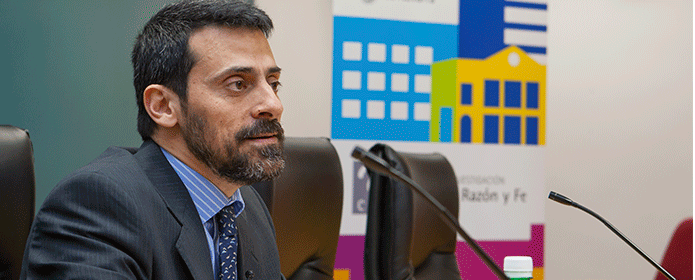Leandro Gaitán: "Mental transference is the last conquest of secularisation because it strips God of eternity".
The doctor in Philosophy and professor of the School of Education and Psychology of the University of Navarra gives the seminar of the "group Science, Reason and Faith" (CRYF) on the attempts to transfer the human mind to other physical supports.

"Mental transference is the last conquest of the secularization process, because it strips God of the only domain that, after centuries of modernity, seemed to belong to him: eternity. It expels him definitively from the human existential horizon". This was stated by Leandro Gaitán, doctor in Philosophy and professor of the School of Education and Psychology of the University of Navarra in the seminar "Mental transference and secularism", organized by the group 'Science, Reason and Faith' (CRYF) of the University of Navarra.
partner of group Mind-Brain of the Institute for Culture and Society (ICS) and member partner of the CRYF, Professor Gaitán has made an approach to the transhumanist current and Mind uploading, or the attempt of the human being to transfer the contents of the brain to external physical supports. As he explained, "the maxim of transhumanism is to leave the confines of the human body by transferring our mind, because it argues that the precariousness of the body is the cause of all our ills". He also pointed out that transhumanism is leading to the secularization of the human being: "this process tends to immanence, to renounce and expel all reference letter to a supernatural and transcendent order, at final, to expel God from the world".
In this sense, he affirmed that the defenders of this movement consider it incompatible with the Christian faith: "They conceive the man-God relationship as something antagonistic, a relationship of civil service examination in which man frees himself completely from God and from his own human condition". Furthermore, he explained that authors such as Francis Bacon and René Descartes came to postulate that the dominion of the human being over nature implies the achievement of immortality by technical means. Thus, "immortal life and its divine content become a dichotomy, something typical of the modern trend," he said.
However, in the face of this current, he affirmed that "the secularism to which we are tending does not have the last word in satisfying the deepest yearnings of the human being. As St. Augustine said, immortality is something great, but it is not enough". As he explained, contrary to what transhumanism thinks, religion is based on the desire for God, for infinity, not for immortality per se, because mere survival cannot satisfy it: "Just as transhumanists desperately seek to escape death, Christianity gives it meaning and allows us to position ourselves before death in a different way.
D. in Philosophy by the University of Navarra and Master's Degree in Cognition and Human Evolution by the Universitat de les Illes Balears, Leandro Gaitán teaches teaching at School of Education and Psychology of the University of Navarra. In addition, he is a member of the group Mind-Brain, of the Institute for Culture and Society (ICS) of the same center and is a member partner of the CRYF. His research work is developed between neuroscience and neurotechnology, transhumanism, religion and ethics.
